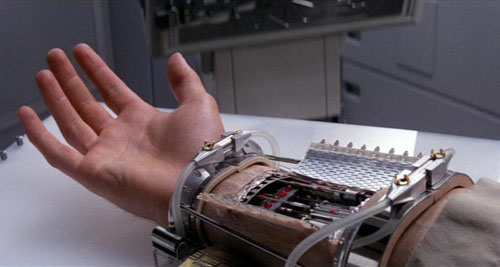Remember at the end of The Empire Strikes Back where Luke gets his hand chopped off by Vader? During one of the closing scenes, a robot doctor finishes up installing a replacement hand for Luke.
Kevin Warwick did something similar as an experiment, but without the whole getting his hand chopped off step. Instead he put an electrode in his hand that could transmit commands to a robotic hand through radio waves. This was done back in 2002, and somehow I never heard of it. I’m sure Ray Kurzweil would be proud. Check out the video below for more information about how he did this, and some other advances like using rat brain cells to power robots. If you are at all interested in robotics, cyborgs, or AI, you’ll be in for a treat.

